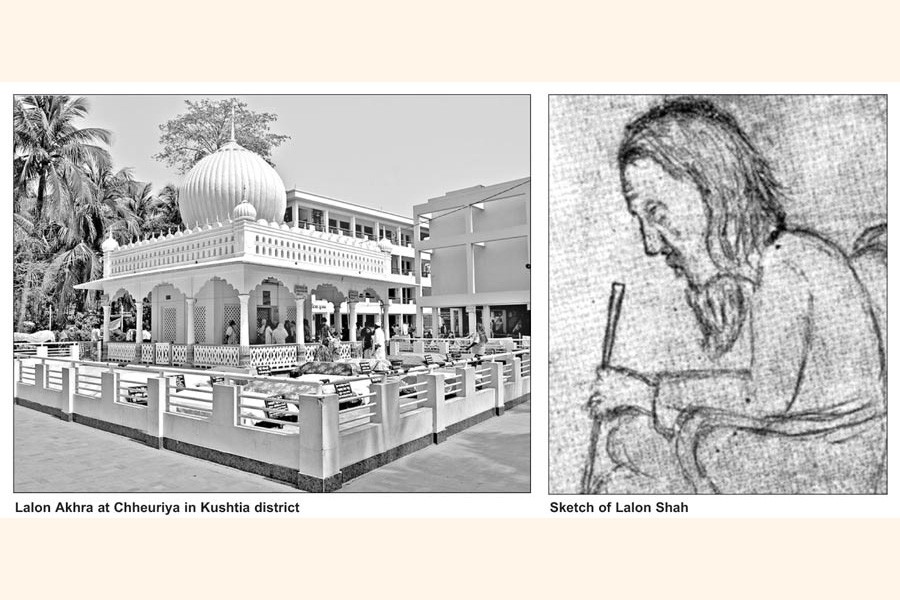JHENIDAH, Oct 15: Lalon Shah is the king of Bauls, a unique mystical tradition of rural Bengal. In Bengali culture Lalon has become an icon of religious tolerance. Widely celebrated as an epitome of religious forbearance, he was also accused of heresy during his lifetime and after his death. In his songs, Lalon envisioned a society where all religions and beliefs would stay in harmony.
Fakir Lalon Shah was born at Harishpur village under Harinakundu upazila in Jhenidah in 1774. No details are found about the life of this bard as Lalon did not reveal anything about himself. He only called himself as Lalon Fakir in some of his songs.
There are few reliable sources for the details of Lalon's early life as he was reticent in revealing his past. It is not known whether he was born in a Hindu or a Muslim family. Lalon had no formal education.
A three-day programme to commemorate the 129th death anniversary of Fakir Lalon Shah, the most prominent figure in the country's baul tradition, will start at Chheuriya under Kumarkhali upazila of Kushtia tomorrow.
Lalon Academy and Kushtia district administration are jointly organising the programme with the assistance of Ministry of Cultural Affairs. The three-day festival includes Lalon Fair, discussion and musical soirees.
Awami League Joint General Secretary and Member of Parliament from Kushtia-3, Mahbub-ul-Alam Hanif will inaugurate the festival tomorrow evening.
Secretary of Ministry of Cultural Affairs Dr Abu Hena Mostafa Kamal and Divisional Commissioner of Khulna Lokman Hossain Mia will be present as the chief guest in the functions on the second and third day respectively.
One account relates that Lalon, during a pilgrimage to the temple of Jagannath with others of his native village, he contracted smallpox and was abandoned by his companions on the banks of the Kaliganga River, from where Malam Shah and his wife Matijan, members of the weaver community in a Muslim-populated village, Cheuriya, took him to their home to convalesce. They gave Lalon land to live where he founded a musical group and remained to compose and perform his songs, inspired by Shiraj Sain, a musician of that village.
Lalon composed numerous songs and poems, which describe his philosophy. It is estimated that he composed about 2,000 to 10,000 songs, of which only about 800 songs are generally considered authentic. Lalon left no written copies of his songs, which were transmitted orally and only later transcribed by his followers. The Baul repertoire exists mainly within the oral tradition.
Visitors and devotees of Lalon Fakir have already started to come to the shrine in droves at the programme.
According to Lalon Academy sources, preparations have been taken to ensure safety of the participants of the programme. More than 700 police personnel including DB police will be engaged to avoid any untoward situation. The whole area of Lalon premises has been brought under CCTV camera surveillance.
Lalon's songs are often about the Creator and the quest for truth. He himself did not belong to any faith group.
Lalon's songs also deal with politics and express criticism of social conditions. One song is about the pirates who have come and looted everything in the village - an allusion to exploitation by the British, but also a coded reference to the enemies within oneself.
In another song, Lalon sings of a time when the blind will lead the blind and the mute will talk loudly.
He composed his songs from this non-sectarian attitude. His songs and philosophies have influenced many people, including Rabindranath Tagore, Kazi Nazrul and Ellen Ginsberg, among many renowned poets, literary, philosophers, and intellectuals across the world. Although his songs are mainly baul songs, many musicians have sung these songs besides baul community members.
Lalon devotees demand that all the songs of the baul king be preserved lest any of those go into oblivion with the passage of time.
Lalon disciples and visitors also demand the extension of the Lalon premises and facilitate Lalon devotees coming to the shrine. The disciples have to gather under open sky.
While contacted, Deputy Commissioner of Kushita and President of Lalon Academy Md Zahir Raihan said, songs of Lalon Shah are being preserved and displayed at the museum of the academy for visitors. Besides, Lalon researchers are collecting and preserving those, he said.
He also said they have planned to make a shed to ease the sufferings of the devotees staying in the open sky.
According to Farida Parveen, a renowned Lalon singer, the pronunciation of the words were also refined in order to make their meanings clearer, whereas the bauls' pronunciations are likely to have local influence
Baul king Lalon Fakir died at Chheuriya on October 17, 1890 at the age of 116 years. He was buried at his akhra (shrine).


